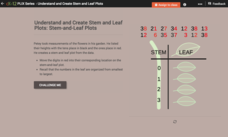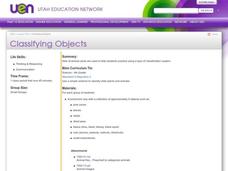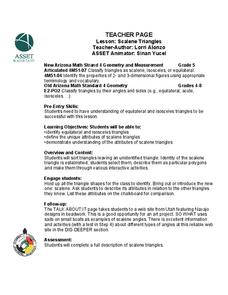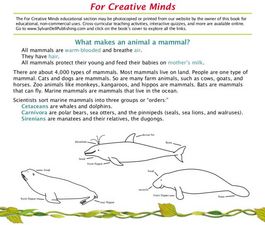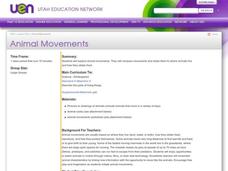Scholastic
Study Jams! The Kingdoms of Life
Life science learners discuss the characteristics of five kingdoms of life: animals, plants, fungi, protists, and bacteria in this video. Viewers find out from the dialogue that scientists group organisms according to similarities. This...
Orange Or Apple
Flashcards Deluxe
A useful study tool, learners create decks or download pre-made decks to review. The app tracks your progress and allows you to customize your experience with each deck. Why not try it out and test yourself and your pupils on thousands...
CK-12 Foundation
Understand and Create Stem-and-Leaf Plots: Stem-and-Leaf Plots
Explore the advantages to using a stem-and-leaf plot using an online lesson. Learners manipulate an animation to create a stem-and-leaf plot. They then calculate statistics for the data using their display. Guiding questions help them...
Curated OER
Classification of Animals
Students explore animal characteristics by participating in a SMART board activity. In this animal classification instructional activity, students utilize a sorting chart to divide different animal names by their observable...
Curated OER
A Planet Full of Animals
Students study animals and practice classifying them through observation activities. In this animal classification instructional activity, students complete a KWL chart about animals. Students then sort pictures of animals into chart...
Curated OER
Classifying Objects
Fourth graders work in small groups to sort and classify a variety of objects. They develop criteria for sorting and explain the characteristics they chose for classification. Groups record and share their classifications.
Curated OER
Scalene Triangles
Fifth graders identify and classify scalene, equilateral, and isosceles triangles. In this triangle lesson, 5th graders define the different attributes of 3 types of triangles and sort them by descriptions and...
Curated OER
Amazing Animals
Students, in beginning and advanced beginning ESL levels, use English in an animal lesson.
Curated OER
Living and Non-Living Things | What’s Alive?
Students compare and contrast living and nonliving things. In this classification lesson plan, students read a book featuring living and nonliving things and then sort pictures of living and nonliving things.
Curated OER
Population Densities
Students explore biological impact by completing a worksheet in class. In this animal population instructional activity, students utilize river rocks and jars to conduct a coqui frog population role play activity. Students define a list...
Curated OER
For Creative Minds: What Makes an Animal a Mammal?
Students read about categories of mammals and their features. Students then construct a marine animal, using given print outs in the instructional activity. Students then create adaptations for their mammal, using a web site reference...
Curated OER
Animal Movements
Students will explore animal movements. They will compare movements and relate them to where animals live and how they obtain food.
Curated OER
Oddball Out: Seashore Creatures
In this science worksheet, students analyze 4 pictures of seashore creatures in a row. Students circle the animal which is different from the others. There are 4 rows of pictures. Answers are provided upside down at the bottom of the page.
Curated OER
Animal Habitats Cut and Paste
In this animal homes worksheet, students cut out 6 pictures of animals and paste them under the appropriate habitat: water or land.
Curated OER
Habitats Activity
In this habitat worksheet, students identify and sort the animals in a box of animal crackers to the habitats to which they belong and then create a graph to document how many animals fit into each habitat.
Curated OER
Farming Number 6
In this environment instructional activity, students identify and explain the importance of water and farming. They identify the differences between food items and whether they are a fruit, vegetable, or animal. Students also respond to...
Curated OER
Animal Coverings
Students compare and contrast the types of coverings found on animals. They identify a wide variety of animals in a museum room. They classify animals based on their coverings as well.
Curated OER
Do You Want to Be My Friend?
Learners participate in a variety of emergent and early-literacy activities based on a "friendship" theme. Learners listen to the book Do You Want to Be My Friend by Eric Carle, then echo read, choral read, and independently read...
Curated OER
Traveling Through the Digestive System
Second graders learn about how the food is broken down in our bodies and the job of each body part involved in our digestive system. The utilize the CD ROM game, "Body Works." This wonderful game takes pupils through the human body's...
Curated OER
Comment le Chat et la Souris sont venus au monde
Read this Vietnamese fairy tale with your advanced French speakers. The story itself is two pages long, and there are two pages of questions that follow. Readers must do their best to guess new vocabulary words in context before they...
Film Education
The Jungle Book
Accompany a viewing of Disney's live-action feature film, The Jungle Book, with a packet equipped with several activities focused on story elements. Scholars discuss and complete diagrams and charts about the movie's characters, setting,...
Alabama Wildlife Federation
Fill the Bill
A hummingbird isn't the only bird with a unique beak. After a discussion about the specific characteristics of bird beaks, pupils complete a station rotation and use different tools to simulate the function of different beaks. They...
Curated OER
Aim-- Use a Carroll Diagram to Sort Animals
In this science activity, students cut out pictures of 12 animals and paste them into the correct space on the Carroll diagram. Students classify animals as living in water or land and with or without legs.
Core Knowledge Foundation
Chaos within the Living World? NOT!
What are the five kingdoms? Fifth graders engage in a series of investigations and research activities focused on the methods of classification used by scientists, as well as the language they use to describe the similarities and...


